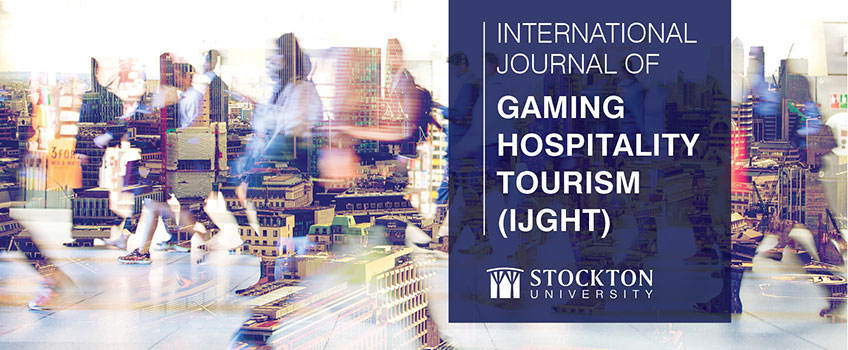International Journal of Gaming, Hospitality and Tourism
The International Journal of Gaming, Hospitality and Tourism (IJGHT) is a peer reviewed, open access journal publishing original research that bridges the gap between industry practitioners, and academic researchers and educators.
IJGHT encourages research covering a broad range of topics, including but not limited to casino gaming, hospitality, tourism, and event management, and using a variety of methods, including qualitative and quantitative research. IJGHT features the work of renowned international industry members, consultants, and academics, while also supporting and endorsing quality research from future practitioners and scholars.
In a world that is constantly evolving to meet new and increasingly complex challenges, IJGHT addresses important topics to advance knowledge and practices in gaming, hospitality, tourism and event management.
IJGHT provides information useful to private for-profit and not-for-profit organizations; schools and academia, governmental agencies, and international entities, on such topics as:
- Applied economics for the Gaming (casino), Hospitality, Tourism and Events Management (GHTE) industries
- Business environment and trends
- Business forecasting
- Business modeling for casinos and restaurants
- Business Policy and Strategy
- Casino operations and management
- Consumer behavior and marketing
- Crisis management (e.g., pandemics) for the GHTE industries
- Customer relations
- Customized research
- Data mining and analysis
- Economic impact studies
- Event Management
- Feasibility analysis
- Financial management and reviews
- Globalization of the GHTE industries
- Growth and shrinkage in the GHTE industries
- Human resources management/marketing
- Information technology and e-commerce
- Intellectual property in the GHTE industries
- Market research for the GHTE industries
- Market segmentation studies
- National and international legislation
- Operations assessment and management
- Performance analytics
- Planning and design
- Retail marketing and merchandising strategy
- Statistics for the GHTE industries
- Strategic management
- Strategy formulation, implementation, evaluation and control
- Survey development and administration
- Sustainability of the GHTE industries
- Technological developments
- Terrorism management in the GHTE industries
- Terrorism, safety and security in tourism
- Tourism development and policy-making
- Tourism research and methodology
- Training and development
- Workforce Management
- Virtual (online, Internet) GHTE industries
- and others
IJGHT celebrates diverse experiences and viewpoints, accepting work for consideration from various disciplines (Arts and Humanities; Business and Enterprise; Education; Health Sciences; Natural Sciences and Mathematics; and Social and Behavioral Sciences), regions, and categories of practice, which address major trends and developments related to gaming, hospitality, tourism, and event management. IJGHT publishes original, double-blind, peer-reviewed professional articles, empirical or theoretical in nature, case studies, research papers, state-of-the-art reviews, and analyses of business practices in the gaming, hospitality, tourism and event management industries.
To facilitate review and publication IJGHT distinguishes between articles submitted as "Academic Study" and "Industry Commentary." Both article categories undergo the same double-blind, peer review process. Authors should indicate how they would like their article to be categorized at the time of submission.
How do I decide if my article is an "Academic Study" or "Industry Commentary"?
Academic Study
- Aims to contribute to a larger pool of knowledge and discourse.
- Asks conceptual and theoretical questions.
- Seeks to answer questions through structured research methodology.
- Results in generalizable insights that often raise additional questions to be examined through future research.
Reviewer Rubric -Academic
Industry Commentary
- Aims to provide solutions to specific challenges.
- Asks practical questions
- Seeks to answer questions through often less structured methods such as direct observations and interviews
- Results are more specifically focused and are often used by industry leaders to make strategic decisions
Reviewer Rubric - Industry
IJGHT welcomes all individuals to submit an original manuscript to be considered for publication provided they own the copyright to the work being submitted or are authorized by the copyright owner or owners to submit the article. Authors are the initial owners of the copyrights to their works (an exception in the non-academic world to this might exist if the authors have, as a condition of employment, agreed to transfer copyright to their employer).
Author(s) may not submit works that have been previously submitted to, or published in, other contexts. A case-by-case exception may be made for works that have substantially evolved, or meaningfully built on prior scholarship by the author(s). In such cases, the author(s) will clearly reference and cite these previous works and demonstrate how the subsequent article deviates from previous versions and meaningfully contributes to community discourse.
All authors, co-authors or contributers listed for an manuscript must have made a significant contribution to, and will share responsibility and accountability for, the work.
Please reference Allegations of Misconduct under the Journal Policies tab for information regarding disputes of authorship.
Please submit articles in English, in Microsoft Word or PDF document formats. Authors needing to use an alternative format should contact IJGHT@Stockton.edu prior to submission.
Manuscript body text should not exceed 7,000 words.
To facilitate blind review, manuscript document or file name should not contain any information identifying the author(s).
To facilitate review and publication IJGHT distinguishes between articles submitted as "Academic Study" and "Industry Commentary." Both article categories undergo the same double-blind, peer review process.
Articles submitted in the context of Academic Study shall include the following elements in the following order: manuscript title; abstract (no more than 250 words); keywords ( no more than 6 words); introduction, literature review, research question, materials and methods, results, discussion; references; appendices (as appropriate). Table(s) and figure(s) must all include captions and should be included in the document near where they are referenced in text.
Articles submitted in the context of Industry Commentary shall include the following elements in the following order: manuscript title; synopsis (brief summary of article, no more than 250 words); keywords (no more than 6 words); introduction; industry context; discussion/commentary; conclusion; references. Table(s) and figure(s) must all include captions and should be included in the document near where they are referenced in text.
Submission templates:
Academic Study - Template
Industry Commentary - Template
References, citations, and general style of manuscripts should follow the latest edition of The Publication Manual of the American Psychological Association (APA Manual). Citation forms for journal articles, books, magazines, newspapers, dissertations, proceedings, audio and visual media and formats for new media, such as electronic publications and the Internet and other types of material are contained in the APA Manual and must be adhered to. Formats for tables, figures and illustrations are also covered. Please defer to APA standards and follow the models and examples in the Manual.
If there are data sets or supplemental materials associated with a manuscript, which are not included in the document itself, please provide a reference (where applicable in the form of hyperlink, DOI or other persistant identifier) as to where the information may be found.
Authors wishing to submit articles for consideration must setup an account via Open Journal Systems (OJS) portal. Authors will be required to submit their affiliation and contact informaton as part of the account registration process.
Submission of a manuscript to IJGHT represents a certification on the part of the authors that it is an original work. By submitting material to IJGHT, the author is stipulating that the material is not currently under review at another journal (electronic or print) and that he or she will not submit the material to another journal (electronic or print) until the completion of the editorial decision process at IJGHT. Prior to final acceptance for publication, authors may withdraw their paper by notice in writing to the Editor if they wish to submit it elsewhere.
Manuscripts should be submitted via the Open Journal Systems (OJS) Portal. We do not accept articles submitted via email. Authors experiencing technical difficulties may contact IJGHT@Stockton.edu for assistance.
By submitting an article, the author(s) confirm their adherence to all Journal policies as outlined on this site and in IJGHT communications.
Any funding sources or competing interests should be noted in the Comments for the Editor when the article is submitted.
Funding Sources: A detailed list of all funding sources, if any, relevant to the manuscript being submitted, and whether these sources had any involvement in any aspects of the research, including, but not limited to, the research questions, methodology, research conduct, or analysis of results.
Competing Interests: Disclosure of any competing interests, financial or otherwise, for authors in the most recent three years; inclusive, but not limited to, funding received from government, industry, community, and/or advocacy groups whether or not the funding recieved was directly or indirectly related to the manuscript being submitted.
There is no fee for submitting work for consideration or publication in IJGHT
Following a preliminary evaluation to eliminate submissions unsuitable for IJGHT, all papers are sent out for a double-blind peer review.
Articles will be submitted to relevant academic and industry professionals, for critique and suggestions for improvement. A minimum two reviews will be solicited for each article.
Reviewer Rubrics will be used to assess the quality of submissions and inform editorial decisions regarding acceptance. "Academic Study" and "Industry Commentary" will be assessed using relevant criteria and expectations as indicated in the respective submission templates. Authors are encouraged to review the rubrics before submitting their work for consideration.
Author(s) will receive anonymous feedback from the reviewers through the Open Journal Systems (OJS) portal. Based on the assessment of the reviewers and at the determination of the editors author(s) will be asked to submit revisions to their manuscript which may or may not be subject to an additional round of review.
Author(s) asked to submit revisions shall also submit a companion document responding directly to reviewer remarks and indicating as appropriate specifically where and how revisions have been made. This step greatly facilitates the subsequent review process.
Final decision to accept an article will not be rendered until revisions are completed.
Once an article has been accepted, author(s) commit to being responsive to communications from IJGHT through the copyediting phase preceding publication.
Note: Author(s) should log into the Open Journal Systems (OJS) portal periodically to monitor the status of their submission and check that system generated emails are not being directed to their spam/junk folder.
IJGHT seeks to foster an environment of collaboration and open discourse among thought leaders and practitioners in the fields of gaming, hospitality, tourism and event management. Readers and authors are encouraged to use tools within the Open Journal System (OJS) platform to leave comments and responses. The Editor, acting as moderator, reserves the right to remove comments which are found to be innapropriate or off-topic. Authors and readers may report innappropriate of off-topic comments by emailing the Editor. To help us locate the specific comment, please include the name of the article, user name and date of comment in your message.
Authors or readers who believe they have found an error in a published work are encouraged to email the Editor to request correction. Depending on the nature of the error the Editor may contact the author(s) or reviewers for their input with respect to choosing the appropriate correction or notation, if one is neccissary. Individuals seeking a correction should provide as much information as possible in their request.

Jane Bokunewicz, PhD
Founding Editor/Editor-in-Chief
Coordinator & Associate Professor of Hospitality, Tourism and Event Management Studies & Institute Coordinator The Lloyd D. Levenson Institute of Gaming, Hospitality & Tourism (LIGHT)
School of Business, Stockton University
More Information
Sarah Grady, MA
Managing Editor
Assistant Director The Lloyd D. Levenson Institute of Gaming, Hospitality & Tourism (LIGHT)
School of Business, Stockton University
More Information
Noel Criscione-Naylor, EdD

George De Feis, DPS, MBA, BE

Jennifer Forney, PhD

Theresa Lind, M.Ed., CMP, CWP, CSEP
Editorial Board Members

Robert Ambrose, MS

Leslie Bobb

John Byrne

Lisa Fagan

Alex Gorod, Ph.D.

Donald Hoover

Gilpatrick Hornsby, Ph. D.

Lilly Jan, Ph. D.

Joy Jones, Ph.D.

Tony Kim, Ph.D.

Sheryl Kline Ph.D.

Don Kneisel

Jeff Lolli, Ed.D., CHE, CHIA

Mary Helen McSweeney-Field, Ph.D., LNHA, FACHCA

Mahatapa Palit, Ph.D.

Mike Pollock

Leslie Scamaca, Ph.D.

Kirsten Tripodi, Ph.D.
The Editorial Board of IJGHT is comprised of 25-30 individuals strategically drawn from content experts, professional partners, thought leaders and emerging academics. At the head will be the Founding Editor/Editor-in-Chief supported by four Section Editors (one for each discipline – Gaming, Hospitality, Tourism and Event Management), a Managing Editor and a team of Editorial Board Members who shall also serve as reviewers. Non-members may also be invited to serve as reviewers as determined by the Editor-in-Chief and Section Editors. A Managing Editor will facilitate receipt of papers and provide administrative support to the Section Editors in the assignment of reviewers and communication with authors. The Section Editors may recommend papers to the Editor-in-Chief who will have final decision over what is published.
The Editor-in-Chief is ultimately responsible for the final content of this publication and reserves the right to make editorial changes, usually not affecting substantive content. Corrections, deletions and additions may include improving writing style, correcting in-text references and bibliographic citations, and fact checking of objective, verifiable data.
Reviewers play a critical role in the life of any journal. Without their support of scholarly inquiry and dedication to integrity, the work of IJGHT would be impossible.
At IJGHT, we hold our reviewers in high regard and have equally high expectations. We encourage reviewers to be thorough in their review of submitted work with the aim of providing constructive critisism that leads to meaningful improvement of the work and whenever possible growth of the author. Reviewers should be conscientious of deadlines and realistic about the time needed to complete a quality review. IJGHT expects reviewers to abide by the Journal's policies and procedures in all respects but especially with regard to confidentiality in maintaining the annonymity of our double-blind review process and in reporting any conflicts of interest that might bias their review of a work, or suspicions of misconduct.
As a prospective member of the Committee on Publication Ethics (COPE), IJGHT expects all peer reviewers to adhere to the ethical guidelines developed by COPE. Individuals considering becoming a peer reviewer should familiarize themselves with COPE Ethical Guidelines for Peer Reviewers.
When creating an account on the IJGHT portal select "Yes, I would like to be contacted with requests to review submissions to this journal" or contact the Editor to receive information about becoming a reviewer.
Reviewers can greatly facilitate the review assignment process by updating the profile on the Open Journal Systems (OJS) portal to include their research/review intrests and professional background.
Following a preliminary evaluation to eliminate submissions unsuitable for IJGHT, all papers are sent out for a double-blind peer review.
Articles will be submitted to relevant academic and industry professionals, for critique and suggestions for improvement. A minimum two reviews will be solicited for each article.
Reviewer Rubrics will be used to assess the quality of submissions and inform editorial decisions regarding acceptance. "Academic Study" and "Industry Commentary" will be assessed using relevant criteria and expectations as indicated in the respective submission templates (See Information for Authors). Authors are encouraged to review the rubrics before submitting their work for consideration.
Reviewers will submit their anonymous feedback to the author(s) through the Open Journal Systems (OJS) portal . Based on the assessment of the reviewers and at the determination of the editors, author(s) will be asked to submit revisions to their manuscript which may or may not be subject to an additional round of review. Reviewers will be notified if an additional round of review is sought and will receive updates regarding the status of the submission/review assignment.
Authors asked to submit revisions shall also submit a companion document responding directly to reviewer remarks and indicating as appropriate specifically where and how revisions have been made. This companion document will be made available to reviewers at the time of review.
Final decision to accept an article will not be rendered until alll reviews are received and revisions are completed. Reviewers will be notified if/when an article is accepted.
To assist reviewers in providing quality feedback to authors and editors, IJGHT uses Reviewer Rubrics. Manuscripts submited in the context of "Academic Study" or "Industry commentary" will be assessed using relevant criteria as outlined in the appropriate rubrics.
Reviewers are encouraged to visit the Open Journal Systems (OJS) portal dashboard periodically monitor their review assignments and check that system generated emails are not being directed to their spam/junk folder.
To facilitate review and publication IJGHT distinguishes between articles submitted as "Academic Study" and "Industry Commentary." Both article categories undergo the same double-blind, peer review process. Authors will indicate how they would like their manuscript to be categorized at the time of submission allowing the appropriate rubric to be applied. Manuscripts submitted as student work default to the 'Industry Commentary' rubric.
Is it "Academic Study" or "Industry Commentary"?
Academic Study
- Aims to contribute to a larger pool of knowledge and discourse.
- Asks conceptual and theoretical questions.
- Seeks to answer questions through structured research methodology.
- Results in generalizable insights that often raise additional questions to be examined through future research.
Reviewer Rubric -Academic
Industry Commentary
- Aims to provide solutions to specific challenges.
- Asks practical questions
- Seeks to answer questions through often less structured methods such as direct observations and interviews
- Results are more specifically focused and are often used by industry leaders to make strategic decisions
Reviewer Rubric - Industry
IJGHT strives to meet the highest standards of Publication Ethics and although we are not yet members, adheres to the Core Practices outlined by the Committee on Publication Ethics (COPE).
IJGHT is an Open Access publication; all articles are freely available online immediately upon article publication. All articles are rigorously peer-reviewed and brought to publication as rapidly as possible. There is no charge for submitting a paper to IJGHT.
Articles in IJGHT are freely available under the Attribution-NonCommercial-NoDerivatives 4.0 International (CC BY-NC-ND 4.0). The Creative Commons Attribution License allows others to re-use the work without permission as long as the work is properly cited. For more information, visit the Creative Commons licenses page. Copyright is retained by the author(s). Where an author is prevented from being the copyright holder (e.g., U.S. government employees), the copyright line and license statement in individual articles will be adjusted. Please contact the editors during or immediately after submission of your paper if you are not the copyright holder.
It is the responsibility of the author to obtain permission from copyright holders for reproducing illustrations, tables, figures, or lengthy quotations. This includes copyright of the author's own material. Papers without correct permissions will not be published.
IJGHT is published twice per year, on a spring/fall schedule. Articles will be accepted on a rolling basis with cutoffs in early January and early July for inclusion in the spring and fall issues.
All articles, papers, news, comments, opinions, findings, conclusions or recommendations in IJGHT are those of their respective authors and do not reflect the views of the Journal, The Lloyd D. Levenson Institute of Gaming Hospitality and Tourism, Stockton University, or the Journal’s editorial staff.
The International Journal of Gaming, Hospitality and Tourism (IJGHT)
John F. Scarpa Academic Center
3711 Atlantic Avenue
Atlantic City, NJ 08401
P: (609) 626-3893
E: IJGHT@Stockton.edu



